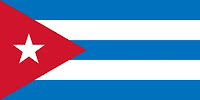(My new American Thinker post)
On this day in 1902, Cuba became an independent country. If you grew up in a Cuban home, or had Cuban friends in high school, or lived in Miami, then you may recall celebrations and good food this day.
To make a long history short, Cubans fought for much of the 19th century but just couldn't push Spain from running the island. Then the USS Mainemade a stop in Havana, blew up or got blown up, and President William McKinley decided to declare war on Spain. It was not a long war and Spain was finally was out and the U.S. ran things for a few years.
On May 20, 1902, Cuba, the last of the major Spanish colonies in the new world, got its independence.
Most of the rest of Latin America won its independence in the first 30 years of the 19th century.
I recall my grandmother, a 10-year-old girl at the time, tell stories of celebrations, parties, Cuban flags hanging from windows and a general sense of happiness around the island.
Of course, independence did not fix Cuba's problems. The island went through several ups and downs, government changes and the communist takeover of 1959. It was a rough 50-plus years but nobody rowed a boat to Florida or left for a better life abroad. The island had problems but Cubans were willing to stay and work on them, as my late father once said.
My friend Carlos Eire, author and professor at Yale, pointed this out about pre-Castro Cuba:
In 1902, the population of Cuba was nearly 1.5 million (a 200,000 decrease from 1895, due largely to the genocidal policies of the Spanish government during Cuba’s final war of independence).
• Between 1900 and 1930, the first three decades of Cuban independence, about one million immigrants flooded into the island, mostly European, and mostly northern Spaniards. This population tsunami also included Asians, Levantines, and Jews. These immigrants doubled the population of the island and changed its complexion, literally. Tens of thousands of immigrants continued to flow into Cuba every year after that, up to 1958. Immigration from the U.S. was comparatively slight, but in 1958 there were more Americans living in Cuba than Cubans in the U.S.A. Emigration from Cuba was minimal during this half century.
• Rates of immigration as high as this and of emigration as low require a robust and growing economy, and a considerable degree of political stability.
• Cuba’s economic success can be measured very accurately by tracing the growth of Havana, both in terms of population and construction. Around 1902, Havana was still a very small city, which had just begun to expand beyond its colonial enclosure, known as “Old Havana.”
What happened after communism? People jumped on rafts to look for freedom, the island's economy has been destroyed and the only people who find Cuba exciting are the leftists who hate the U.S. I should know about the latter because I've debated quite a few of them over the years. As I tell them, you love Cuba because you hate the U.S. I remind them that they wouldn't last one second living in the reality of Cuba. It's great to be a "fidelista" over French wine at an expensive restaurant.
Maybe Cuba will eventually celebrate another independence day as a democratic country. We hope so! I’ll remember my parents, my grandparents, and so many more on that future day.
